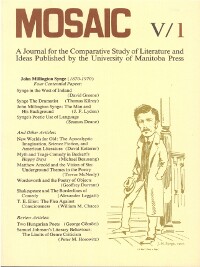Issue 5.1
Overview

General Issue
Published: October 1971
See the issue summary and contents below.
10 essays, totalling 176 pages
$15.00 CAD
Nearly half of the essays in this general issue of Mosaic focus on the work of John Millington Synge, including analyses of his relationship to Western Ireland, his relationship to the dramatic medium, a short biographical sketch, and his poetics. The issue also considers American science fiction and the apocalypse, Samuel Beckett’s Happy Days, Matthew Arnold’s poetry, objects in William Wordsworth’s poetry, the organization of Shakespeare’s comedy, and T.S. Eliot’s relation to consciousness.
Synge in the West of IrelandDavid Greene | |
Synge The DramatistThomas Kilroy | |
John Millington Synge: The Man and His BackgroundJ.F. Lyndon | |
Synge's Poetic Use of LanguageSeamus Deane | |
New Worlds for Old: The Apocalyptic Imagination, Science Fiction, and American LiteratureDavid Ketterer | |
Myth and Tragi-Comedy in Beckett's Happy DaysMichael Beausang | |
Matthew Arnold and the Vision of Sin: Underground Themes in the PoetryTrevor McNeely | |
Wordsworth and the Poetry of ObjectsGeoffrey Durrant | |
Shakespeare and the Borderlines of ComedyAlexander Leggatt | |
T.S. Eliot: The Plea Against ConsciousnessWilliam M. Chace | |
Two Hungarian Poets: A Review of Poems of Endre Ady, The Boy Changed into a StagGeorge Gömöri | |
Samuel Johnson's Literary Behaviour: The Limits of Genre CriticismPeter M. Horowitz A Review of Paul Fussel, Samuel Johnson and the Life of Writing. (New York: 1971) |